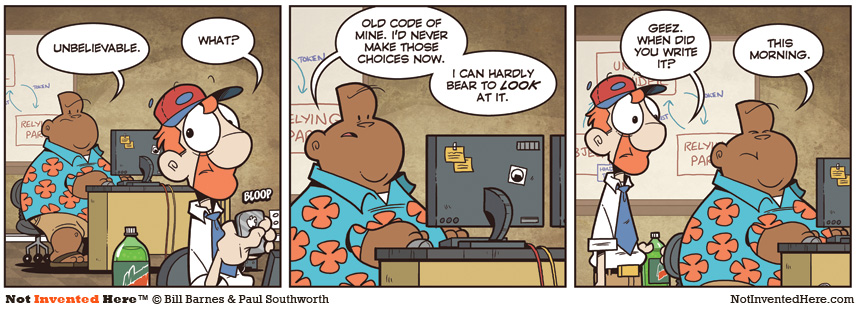Hello.
I'm a web developer just taking a short break from converting a mess of legacy C# code into something more manageable. It's nice to be here.
Olive34 0 Newbie Poster
Recommended Answers
Jump to PostI think he’s just refactoring the existing spaghetti code, if I understand correctly.
Jump to PostAlso, just so that Olive realizes as she’s new here, what I was referring to is the platform that powers this site, DaniWeb, which I’ve been working on since 2002.
Jump to PostOld saying that I have to share:
When I wrote this code, God and I knew how it worked.Now only God knows
Jump to PostMy code comments are typically just notes to myself to refresh my memory of why I did something a certain way, or tongue-in-cheek jokes to myself. It's very heavily commented though. Oh the joys of being the only one working on this platform for two decades.
All 16 Replies
Dani 4,658 The Queen of DaniWeb Administrator Featured Poster Premium Member
rproffitt 2,701 https://5calls.org Moderator
Reverend Jim 5,225 Hi, I'm Jim, one of DaniWeb's moderators. Moderator Featured Poster
Dani 4,658 The Queen of DaniWeb Administrator Featured Poster Premium Member
Olive34 0 Newbie Poster
rproffitt 2,701 https://5calls.org Moderator
Dani 4,658 The Queen of DaniWeb Administrator Featured Poster Premium Member
Dani 4,658 The Queen of DaniWeb Administrator Featured Poster Premium Member
rproffitt 2,701 https://5calls.org Moderator
Reverend Jim 5,225 Hi, I'm Jim, one of DaniWeb's moderators. Moderator Featured Poster
Olive34 0 Newbie Poster
Reverend Jim 5,225 Hi, I'm Jim, one of DaniWeb's moderators. Moderator Featured Poster
Reverend Jim 5,225 Hi, I'm Jim, one of DaniWeb's moderators. Moderator Featured Poster
Dani 4,658 The Queen of DaniWeb Administrator Featured Poster Premium Member
Olive34 0 Newbie Poster
bravomorris9 0 Light Poster
Be a part of the DaniWeb community
We're a friendly, industry-focused community of developers, IT pros, digital marketers, and technology enthusiasts meeting, networking, learning, and sharing knowledge.

